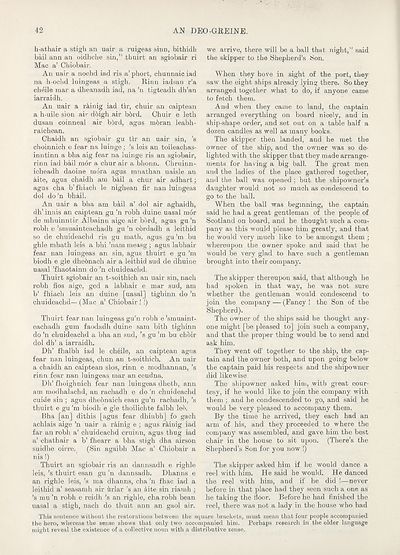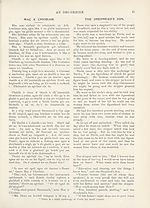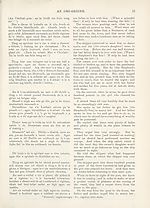An Comunn Gàidhealach Publications > Deo-gréine > Volume 13, October 1917-September 1918
(50) Page 42
Download files
Complete book:
Individual page:
Thumbnail gallery: Grid view | List view

42
AN DEO-GREINE.
h-athair a stigli an uair a ruigeas sinn, bithidh
bail ann an oidhclie sin,” tbuirt an sgiobair ri
Mac a’ Ohiobair.
An uair a nochd iad ris a’phort, chunnaic iad
na h-ochd luingeas a stigh. Rinn iadsan r’a
cheile mar a dheanadh iad, na ’n tigteadh dh’an
iarraidh.
An uair a rkinig iad tir, chuir an caiptean
a h-uile sion air ddigh air b6rd. Chuir e leth
dusan coinneal air bord, agus moran leabh-
raichean.
Chaidh an sgiobair gu tir an uair sin, ’s
choinnich e fear na luinge; ’s leis an toileachas-
inntinn a bha aig fear na luinge ris an sgiobair,
rinn iad bail mor a chur air a bhonn. Chruinn-
icheadh daoine mor a agus mnathan uaisle an
&ite, agus chaidh am bail a chur air adhart;
agus cha b’fhiach le nighean fir nan luingeas
dol do ’n bhkil.
An uair a bha am bail a’ dol air aghaidh,
dh’ innis an caiptean gu ’n robh duine uasal mor
de mhuinntir Albainn aige air bbrd, agus gu ’n
robh e ’smuainteachadh gu ’n chrdadh a leithid
so de chuideachd ris gu math, agus gu’m bu
ghle mhath leis a bhi ’nam measg; agus labhair
fear nan luingeas an sin, agus thuirt e gu’m
biodh e gle dhehnach air a leithid sud de dhuine
uasal ’fhaotainn do ’n chuideachd.
Thuirt sgiobair an t-soithich an uair sin, nach
robh fios aige, ged a labhair e mar sud, am
b’ fhiach leis an duine [uasal] tighinn do ’n
chuideachd— (Mac a’ Chiobair ! !)
Thuirt fear nan luingeas gu’n robh e ’smuaint¬
eachadh gum faodadh duine sam bith tighinn
do ’n chuideachd a bha an sud, ’s gu’m bu choir
dol dh’ a iarraidh.
Dh’ fhalbh iad le ch6ile, an caiptean agus
fear nan luingeas, chun an t-soithich. An uair
a chaidh an caiptean slos, rinn e modhannan, ’s
rinn fear nan luingeas mar an ceudna.
Dh’ fhoighnich fear nan luingeas dheth, ann
am modhalachd, an rachadh e do ’n chuideachd
cuide sin; agus dhehnaich esan gu’n rachadh, ’s
thuirt e gu'm biodh e gle thoilichte falbh leo.
Bha [an] dithis [agus fear dhiubh] fo gach
achlais aige ’n uair a rainig e ; agus rainig iad
far an robh a’ chuideachd cruinn, agus thug iad
a’ chathair a b’ fhearr a bha stigh dha airson
suidhe oirre. (Sin agaibh Mac a’ Chiobair a
nis !)
Thuirt an sgiobair ris an dannsadh e righle
leis, ’s thuirt esan gu ’n dannsadh. Dhanns e
an righle leis, ’s ma dhanns, cha ’n fhac iad a
leithid a’ seasamh air urlar’s an aite sin riamh ;
’s mu ’n robh e reidh’s an righle, cha robh bean
uasal a stigh, nach do thuit ann an gaol air.
we arrive, there will be a ball that night,” said
the skipper to the Shepherd’s Son.
When they hove in sight of the port, they
saw the eight ships already lying there. So they
arranged together what to do, if anyone came
to fetch them.
And when they came to land, the captain
arranged everything on board nicely, and in
ship-shape order, and set out bn a table half a
dozen candles as well as many books.
The skipper then landed, and he met the
owner of the ship, and the owner was so de¬
lighted with the skipper that they made arrange¬
ments for having a big ball. The great men
and the ladies of the place gathered together,
and the ball was opened; but the shipowner’s
daughter would not so much as condescend to
go to the ball.
When the ball was beginning, the captain
said he had a great gentleman of the people of
Scotland on board, and he thought such a com¬
pany as this would please him greatly, and that
he would very much like to be amongst them ;
whereupon the owner spoke and said that he
would be very glad to have such a gentleman
brought into their company.
The skipper thereupon said, that although he
had spoken in that way, he was not sure
whether the gentleman would condescend to
join the company — (Fancy ! the Son of the
Shepherd).
The owner of the ships said he thought any¬
one might [be pleased to] join such a company,
and that the proper thing would be to send and
ask him.
They went off together to the ship, the cap¬
tain and the owner both, and upon going below
the captain paid his respects and the shipowner
did likewise
The shipowner asked him, with great cour¬
tesy, if he would like to join the company with
them ; and he condescended to go, and said he
would be very pleased to accompany them.
By the time he arrived, they each had an
arm of his, and they proceeded to where the
company was assembled, and gave him the best
chair in the house to sit upon. (There’s the
Shepherd’s Son for you now !)
The skipper asked him if he would dance a
reel with him. He said he would. He danced
the reel with him, and if he did !—never
before in that place had they seen such a one as
he taking the floor. Before he had finished the
reel, there was not a lady in the house who had
This sentence without the restorations between the square brackets, must mean that four people accompanied
the hero, whereas the sense shows that only two accompanied him. Perhaps research in the older language
might reveal the existence of a collective noun with a distributive sense,
AN DEO-GREINE.
h-athair a stigli an uair a ruigeas sinn, bithidh
bail ann an oidhclie sin,” tbuirt an sgiobair ri
Mac a’ Ohiobair.
An uair a nochd iad ris a’phort, chunnaic iad
na h-ochd luingeas a stigh. Rinn iadsan r’a
cheile mar a dheanadh iad, na ’n tigteadh dh’an
iarraidh.
An uair a rkinig iad tir, chuir an caiptean
a h-uile sion air ddigh air b6rd. Chuir e leth
dusan coinneal air bord, agus moran leabh-
raichean.
Chaidh an sgiobair gu tir an uair sin, ’s
choinnich e fear na luinge; ’s leis an toileachas-
inntinn a bha aig fear na luinge ris an sgiobair,
rinn iad bail mor a chur air a bhonn. Chruinn-
icheadh daoine mor a agus mnathan uaisle an
&ite, agus chaidh am bail a chur air adhart;
agus cha b’fhiach le nighean fir nan luingeas
dol do ’n bhkil.
An uair a bha am bail a’ dol air aghaidh,
dh’ innis an caiptean gu ’n robh duine uasal mor
de mhuinntir Albainn aige air bbrd, agus gu ’n
robh e ’smuainteachadh gu ’n chrdadh a leithid
so de chuideachd ris gu math, agus gu’m bu
ghle mhath leis a bhi ’nam measg; agus labhair
fear nan luingeas an sin, agus thuirt e gu’m
biodh e gle dhehnach air a leithid sud de dhuine
uasal ’fhaotainn do ’n chuideachd.
Thuirt sgiobair an t-soithich an uair sin, nach
robh fios aige, ged a labhair e mar sud, am
b’ fhiach leis an duine [uasal] tighinn do ’n
chuideachd— (Mac a’ Chiobair ! !)
Thuirt fear nan luingeas gu’n robh e ’smuaint¬
eachadh gum faodadh duine sam bith tighinn
do ’n chuideachd a bha an sud, ’s gu’m bu choir
dol dh’ a iarraidh.
Dh’ fhalbh iad le ch6ile, an caiptean agus
fear nan luingeas, chun an t-soithich. An uair
a chaidh an caiptean slos, rinn e modhannan, ’s
rinn fear nan luingeas mar an ceudna.
Dh’ fhoighnich fear nan luingeas dheth, ann
am modhalachd, an rachadh e do ’n chuideachd
cuide sin; agus dhehnaich esan gu’n rachadh, ’s
thuirt e gu'm biodh e gle thoilichte falbh leo.
Bha [an] dithis [agus fear dhiubh] fo gach
achlais aige ’n uair a rainig e ; agus rainig iad
far an robh a’ chuideachd cruinn, agus thug iad
a’ chathair a b’ fhearr a bha stigh dha airson
suidhe oirre. (Sin agaibh Mac a’ Chiobair a
nis !)
Thuirt an sgiobair ris an dannsadh e righle
leis, ’s thuirt esan gu ’n dannsadh. Dhanns e
an righle leis, ’s ma dhanns, cha ’n fhac iad a
leithid a’ seasamh air urlar’s an aite sin riamh ;
’s mu ’n robh e reidh’s an righle, cha robh bean
uasal a stigh, nach do thuit ann an gaol air.
we arrive, there will be a ball that night,” said
the skipper to the Shepherd’s Son.
When they hove in sight of the port, they
saw the eight ships already lying there. So they
arranged together what to do, if anyone came
to fetch them.
And when they came to land, the captain
arranged everything on board nicely, and in
ship-shape order, and set out bn a table half a
dozen candles as well as many books.
The skipper then landed, and he met the
owner of the ship, and the owner was so de¬
lighted with the skipper that they made arrange¬
ments for having a big ball. The great men
and the ladies of the place gathered together,
and the ball was opened; but the shipowner’s
daughter would not so much as condescend to
go to the ball.
When the ball was beginning, the captain
said he had a great gentleman of the people of
Scotland on board, and he thought such a com¬
pany as this would please him greatly, and that
he would very much like to be amongst them ;
whereupon the owner spoke and said that he
would be very glad to have such a gentleman
brought into their company.
The skipper thereupon said, that although he
had spoken in that way, he was not sure
whether the gentleman would condescend to
join the company — (Fancy ! the Son of the
Shepherd).
The owner of the ships said he thought any¬
one might [be pleased to] join such a company,
and that the proper thing would be to send and
ask him.
They went off together to the ship, the cap¬
tain and the owner both, and upon going below
the captain paid his respects and the shipowner
did likewise
The shipowner asked him, with great cour¬
tesy, if he would like to join the company with
them ; and he condescended to go, and said he
would be very pleased to accompany them.
By the time he arrived, they each had an
arm of his, and they proceeded to where the
company was assembled, and gave him the best
chair in the house to sit upon. (There’s the
Shepherd’s Son for you now !)
The skipper asked him if he would dance a
reel with him. He said he would. He danced
the reel with him, and if he did !—never
before in that place had they seen such a one as
he taking the floor. Before he had finished the
reel, there was not a lady in the house who had
This sentence without the restorations between the square brackets, must mean that four people accompanied
the hero, whereas the sense shows that only two accompanied him. Perhaps research in the older language
might reveal the existence of a collective noun with a distributive sense,
Set display mode to:
![]() Universal Viewer |
Universal Viewer | ![]() Mirador |
Large image | Transcription
Mirador |
Large image | Transcription
| An Comunn Gàidhealach > An Comunn Gàidhealach Publications > Deo-gréine > Volume 13, October 1917-September 1918 > (50) Page 42 |
|---|
| Permanent URL | https://digital.nls.uk/125232701 |
|---|
| Description | Leabhar 13, Mìos Deireannach an Fhogharaidh 1917 gu Darna Mìos an Fhogharaidh 1918 |
|---|---|
| Attribution and copyright: |
|
| Description | This contains items published by An Comunn, which are not specifically Mòd-related. It includes journals, annual reports and corporate documents, policy statements, educational resources and published plays and literature. It is arranged alphabetically by title. |
|---|
| Description | A collection of over 400 items published by An Comunn Gàidhealach, the organisation which promotes Gaelic language and culture and organises the Royal National Mòd. Dating from 1891 up to the present day, the collection includes journals and newspapers, annual reports, educational materials, national Mòd programmes, published Mòd literature and music. |
|---|---|
| Additional NLS resources: |
|

